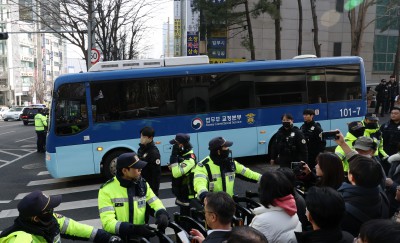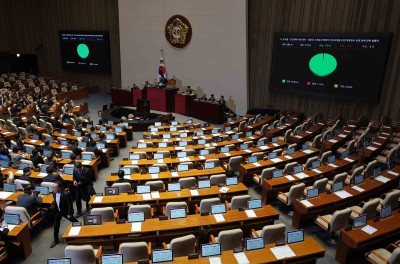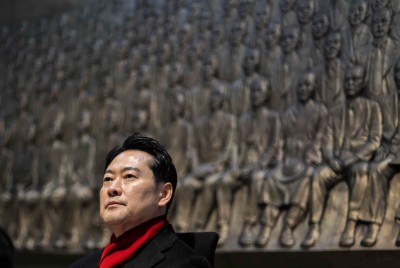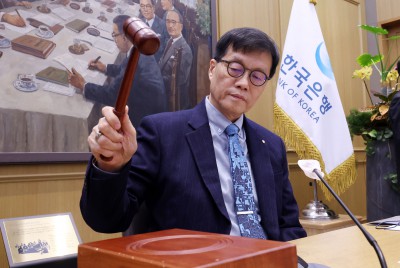Now, I've heard rumors that a few of you have some concerns about the new health care law. So let me be the first to say that anything can be improved. If you have ideas about how to improve this law by making care better or more affordable, I am eager to work with you. We can start right now by correcting a flaw in the legislation that has placed an unnecessary bookkeeping burden on small businesses.
What I'm not willing to do is go back to the days when insurance companies could deny someone coverage because of a pre-existing condition. I'm not willing to tell James Howard, a brain cancer patient from Texas, that his treatment might not be covered. I'm not willing to tell Jim Houser, a small business owner from Oregon, that he has to go back to paying $5,000 more to cover his employees. As we speak, this law is making prescription drugs cheaper for seniors and giving uninsured students a chance to stay on their parents' coverage. So instead of re-fighting the battles of the last two years, let's fix what needs fixing and move forward.
Now, the final step - a critical step - in winning the future is to make sure we aren't buried under a mountain of debt.
We are living with a legacy of deficit-spending that began almost a decade ago. And in the wake of the financial crisis, some of that was necessary to keep credit flowing, save jobs, and put money in people's pockets.
But now that the worst of the recession is over, we have to confront the fact that our government spends more than it takes in. That is not sustainable. Every day, families sacrifice to live within their means. They deserve a government that does the same.
So tonight, I am proposing that starting this year, we freeze annual domestic spending for the next five years. This would reduce the deficit by more than $400 billion over the next decade, and will bring discretionary spending to the lowest share of our economy since Dwight Eisenhower was president.
This freeze will require painful cuts. Already, we have frozen the salaries of hardworking federal employees for the next two years. I've proposed cuts to things I care deeply about, like community action programs. The Secretary of Defense has also agreed to cut tens of billions of dollars in spending that he and his generals believe our military can do without.
I recognize that some in this Chamber have already proposed deeper cuts, and I'm willing to eliminate whatever we can honestly afford to do without. But let's make sure that we're not doing it on the backs of our most vulnerable citizens. And let's make sure what we're cutting is really excess weight. Cutting the deficit by gutting our investments in innovation and education is like lightening an overloaded airplane by removing its engine. It may feel like you're flying high at first, but it won't take long before you'll feel the impact.
Now, most of the cuts and savings I've proposed only address annual domestic spending, which represents a little more than 12% of our budget. To make further progress, we have to stop pretending that cutting this kind of spending alone will be enough. It won't.
The bipartisan Fiscal Commission I created last year made this crystal clear. I don't agree with all their proposals, but they made important progress. And their conclusion is that the only way to tackle our deficit is to cut excessive spending wherever we find it - in domestic spending, defense spending, health care spending, and spending through tax breaks and loopholes.
This means further reducing health care costs, including programs like Medicare and Medicaid, which are the single biggest contributor to our long-term deficit. Health insurance reform will slow these rising costs, which is part of why nonpartisan economists have said that repealing the health care law would add a quarter of a trillion dollars to our deficit. Still, I'm willing to look at other ideas to bring down costs, including one that Republicans suggested last year: medical malpractice reform to rein in frivolous lawsuits.
To put us on solid ground, we should also find a bipartisan solution to strengthen Social Security for future generations. And we must do it without putting at risk current retirees, the most vulnerable, or people with disabilities; without slashing benefits for future generations; and without subjecting Americans' guaranteed retirement income to the whims of the stock market.
And if we truly care about our deficit, we simply cannot afford a permanent extension of the tax cuts for the wealthiest 2% of Americans. Before we take money away from our schools, or scholarships away from our students, we should ask millionaires to give up their tax break.
It's not a matter of punishing their success. It's about promoting America's success.
In fact, the best thing we could do on taxes for all Americans is to simplify the individual tax code. This will be a tough job, but members of both parties have expressed interest in doing this, and I am prepared to join them.
So now is the time to act. Now is the time for both sides and both houses of Congress - Democrats and Republicans - to forge a principled compromise that gets the job done. If we make the hard choices now to rein in our deficits, we can make the investments we need to win the future.
Let me take this one step further. We shouldn't just give our people a government that's more affordable. We should give them a government that's more competent and efficient. We cannot win the future with a government of the past.
We live and do business in the information age, but the last major reorganization of the government happened in the age of black and white TV. There are twelve different agencies that deal with exports. There are at least five different entities that deal with housing policy. Then there's my favorite example: the Interior Department is in charge of salmon while they're in fresh water, but the Commerce Department handles them in when they're in saltwater. And I hear it gets even more complicated once they're smoked.
In the coming year, we will also work to rebuild people's faith in the institution of government. Because you deserve to know exactly how and where your tax dollars are being spent, you will be able to go to a website and get that information for the very first time in history. Because you deserve to know when your elected officials are meeting with lobbyists, I ask Congress to do what the White House has already done: put that information online. And because the American people deserve to know that special interests aren't larding up legislation with pet projects, both parties in Congress should know this: if a bill comes to my desk with earmarks inside, I will veto it.
(계속)
























